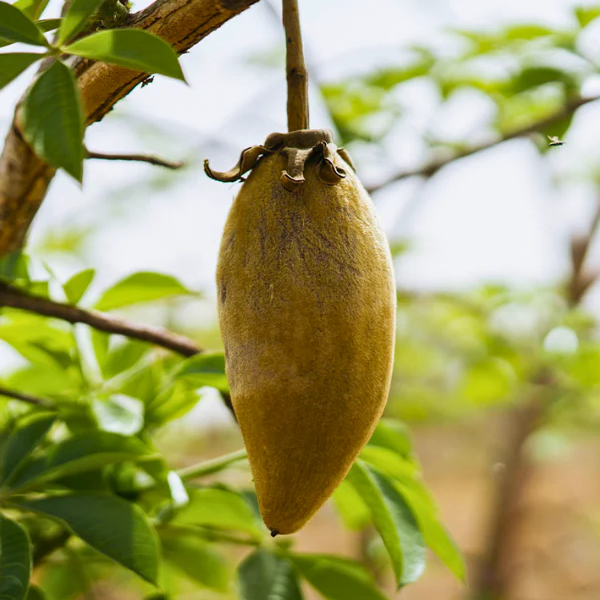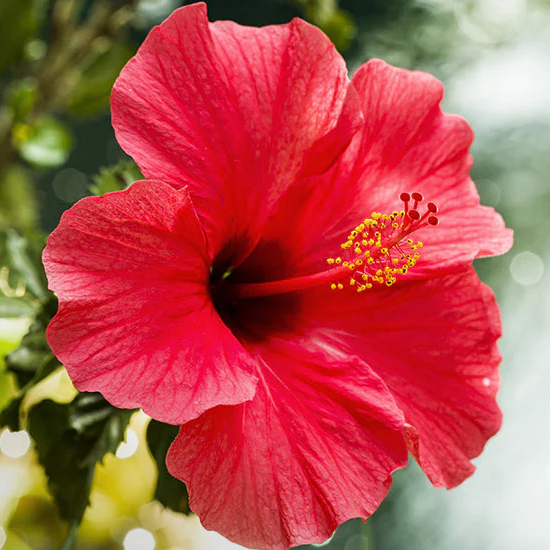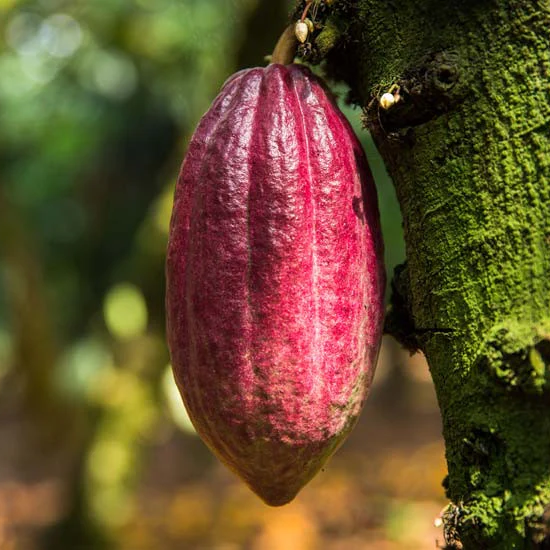Baobab is the fruit of the iconic African baobab tree (you may recognise it from The Lion King), also known as The Tree of Life. It is pronounced ba-u-bab or bay-o-bab depending where abouts in Africa you are. Baobab trees grow in 32 African countries as well as some parts of Australia and Asia. Baobab is the only fruit in the world that dries while it is still hanging on the branch. It bakes for months in the African sunshine so when its hard shell is opened, the fruit pulp within is completely dry. Baobab fruit is prized for its high vitamin C and fibre content and its exceptional levels of antioxidants. It has been used by women in Africa as a source of health and wellbeing since ancient times. Read the full health benefits of Baobab Powder here.
Baobab Frequently Asked Questions
What is Baobab?
How is baobab powder made?
Baobab fruits are collected by hand by women producers in rural Africa. They are harvested either while they are still hanging on the tree or once they have fallen to the ground. The hard coconut-like shells are then cracked open and the fruit pulp within is separated from the seeds and shell. As the fruit pulp naturally dries while it is still hanging on the branch, there is no heat necessary to make baobab powder. The dry pieces of fruit pulp are simply ground down into a powder and then sieved. Remarkably, the fruit has a natural shelf life of 3 years - so there are no preservatives added to Aduna Baobab Powder.
What does Aduna baobab powder taste like?
Unlike many other superfoods and supplements, baobab is completely delicious! It has a sweet, citrussy flavour - and is often described as a healthy sherbet. Aduna Baobab Powder is the first superfood to win a prestigious UK Great Taste Award (2015). Check out our article on 5 easy ways to use baobab for some of our favourite ways to feel the #baobablove!.
What are the benefits of having baobab powder?
A single serving of Aduna Baobab Powder (2-4 teaspoons or 10g) contains 33% of your daily requirement of vitamin C, supporting a wide range of health benefits ranging from energy release to immunity and healthy, glowing skin. It is almost 50% fibre (two thirds soluble and one third insoluble) supporting a slow release of the natural sugars into your bloodstream and helping keep you fuller for longer. Soluble fibre is also a prebiotic, helping improve digestive health. Baobab also has the highest antioxidant content of any fruit, according to The Journal of Nutrition, supporting younger looking skin. Read our article on baobab benefits to learn more.
How do I use baobab powder?
Thanks to its delicious, sweet and citrussy flavour, it is easy to incorporate baobab powder into your daily routine. Mix 2-4 teaspoons into your favourite smoothie or juice, stir into yoghurt or porridge or sprinkle onto granola or fresh fruit. One of the simplest ways to take baobab is with water for a refreshing and hydrating drink. As it's so fibre rich, make a paste with a little liquid before topping up your glass or shake into your water bottle and any lumps will magically disappear! If you are feeling under the weather, mix baobab with hot water and a slice of lemon and ginger or try our Vitality Super-Tea - made with lemon, ginger and baobab. To enjoy the benefits of baobab on-the-go, try our Aduna Banana Boost Energy Bar. Made from cold-pressed fruit and nuts, each bar is free from gluten, dairy and wheat containing ingredients and has no added sugar. That's snack time sorted! However you take baobab, we recommend enjoying it as part of a varied, balanced diet and healthy lifestyle. Check out our baobab recipe page for more inspiration (both sweet and savoury).
How much baobab powder should I take a day?
We recommend taking two to four teaspoons (10g) of Aduna Baobab Powder per day to enjoy maximum health benefits. Just like any fruit, however, its really up to you how much you take. There’s no danger of having too much baobab as any excess vitamin C will simply pass through the body. It’s easy to add to your daily routine, check out some of our favourite ways to use baobab.
Are there any known side-effects of taking baobab powder?
There are no known side effects or allergenic effects caused by direct consumption of baobab powder. You can’t have too much baobab as once the body has got its fill of vitamin C, any excess you consumer simply passes through the system. However, as with any dietary changes, it is worth contacting your doctor or dietician for individual recommendations if you are concerned.
Why is baobab powder high in sugar? Is it suitable for people with diabetes?
Aduna Baobab Powder is 100% fruit, and like all fruits, it naturally contains sugar (31.1g fruit sugar per 100g). A serving of baobab is only 10g so you are only ingesting a small amount of sugar at a time. It’s also important to remember that our body responds to natural sugars differently to refined sugars. The high fibre content of baobab (nearly 50%) means that it promotes the slow release of sugars into the bloodstream, ensuring steady levels of energy throughout the day. This makes baobab suitable for people suffering from blood glucose control issues such as type 2 diabetes.
Is baobab low in cholesterol? Does it help to lower cholesterol?
As baobab is a pure fruit powder, it does not contain cholesterol and is less than 1% fat. High-fibre foods and specifically those with soluble fibre (like baobab) are very effective in lowering levels of “bad cholesterol” i.e. LDL (Low Density Lipoprotein). Cholesterol is usually reabsorbed in the gut but soluble fibre prevents the reabsorption of cholesterol; therefore more cholesterol must be drawn from the blood and subsequently the level of bad cholesterol in the blood decreases. Baobab is nearly 50% fibre, two thirds of which is soluble, so it is likely to have a positive impact on cholesterol levels.
Is baobab powder a suitable replacement for vitamin tablets?
Baobab is a rich source of vitamin C. As it is 100% natural, our bodies can absorb the nutrients more easily than with manufactured supplements, which need to be broken down by the body before the nutrients can be utilised. Aduna Baobab is pure fruit powder so it is easily recognised by the body and its nutrients are readily absorbed. It also tastes delicious so it is easy to incorporate into your daily diet. As a single serving of baobab powder contains 33% of your daily recommended amount of vitamin C, it is a good replacement for vitamin C tablets. It also works well with most iron supplements (we recommend Moringa powder as a natural alternative) as its high vitamin C content supports the absorption of iron.
Is baobab powder suitable for pregnant women? What about children?
Aduna baobab is safe for pregnant women and for women who have just given birth. In fact, it is recommended that pregnant women increase their vitamin C intake by 10mg a day and by 30mg a day during lactation (read more about baobab and pregnancy here). As Aduna Baobab Powder is a naturally rich source of vitamin C it is easier for the body to absorb than manufactured vitamin C tablets. Furthermore, it is pure fruit powder, so is completely safe for pregnant women and children. The fact that it tastes good (a proud winner of a Great Taste Award!) means that it is easy to incorporate into a child’s diet, e.g. in smoothies or porridge. Check out our baobab recipes for inspiration.
Is baobab a pre-biotic?
Yes! Aduna Baobab Powder contains almost 50% fibre, two thirds of which is soluble. Soluble fibre is a prebiotic. It ferments in the gut and stimulates the growth and activity of beneficial probiotic bacteria in the colon, helping to improve digestive health.
Can I have baobab powder with water?
Mixing baobab with water is an easy way to keep your vitamin C levels topped up and to stay nice and energised throughout the day. Because baobab powder is high in fibre and has not been processed, it does not dissolve instantly when mixed with water. The best way to take baobab and water is simply to shake it into your water bottle - the act of shaking makes any fibrous lumps magically disappear! If you don’t have a bottle handy, mix the powder with a little water into a paste before topping up your glass. Check out our list of 5 easy ways to use baobab or our recipes page for lots more ideas.
Can I have baobab powder with other superfoods?
It is perfectly safe to take baobab with other superfoods. Most of us at Aduna take all three of our superfood powders every day - as do hundreds of our customers!
Can you bake and cook with baobab powder? Does cooking it damage the nutrient content?
Baobab is traditionally used for baking in Africa and is known as a good raising and gelling agent. However, vitamin C is susceptible to heat and so it is likely that exposing baobab to heat, particularly over 70°C will reduce its vitamin C content. We recommend adding it to hot dishes after cooking where possible - stirring it into sauces or sprinkling onto porridge before serving.
What is the antioxidant level of baobab compared to other superfoods?
Baobab has the highest antioxidant content of any whole fruit in the world, according to The Journal of Nutrition. It has an ORAC value of 24,000 umol/100g, providing 20x more antioxidants than green tea and more than blueberries and pomegranates combined.
Why should I buy Aduna Baobab Powder?
Aduna is one of the pioneers of the global baobab industry. We have our own baobab fruit supply-chain in Northern Ghana, which we hold to rigorous control standards, ensuring our baobab is the highest quality powder in the market for purity, taste and nutritional content. All of our fruit is organically-certified and independently laboratory tested at multiple stages of processing. As baobab is a fruit, the flavour varies depending on where it is grown so not all baobab powders on the market taste the same. Aduna Baobab Powder is made from sweet and citrussy West African baobab fruits and is the only baobab powder to have won a Great Taste Award (2015). Any producer providing baobab into the EU must have what is known as Novel Foods authorisation from the European Commission. This is to safeguard consumers to ensure that the product is safe and correctly labeled. All Aduna baobab products have Novel Foods authorisation. Our powder is also packed in BRC6 approved facilities. This is the global standard for food safety and is the international benchmark for product safety and quality certification. We are also a social business so rather than buying through a third party, we work directly with small-scale producers to harvest and process their fruits. We are currently working with 700 women in Upper East Ghana who are benefiting from life-changing, sustainable income streams, enabling them to provide basic needs for their families. Every time your purchase an Aduna product you are directly supporting the creation of sustainable livelihoods for rural households.
How does baobab powder compare to other superfoods?
Unlike most superfood powders, baobab does not need to be spray-dried, freeze-dried or transformed in any way. It is 100% pure fruit in its natural form and there are no additives or preservatives added. We simply harvest the fruits, remove the seeds and sieve, to create a natural fruit powder. This means it is safe for most people, including young children and pregnant women. Aduna Baobab also has a delicious sweet and citrussy flavour. It is the first superfood to win a Great Taste Award and is easy to add into your diet. Check our some our favourite ways to use baobab powder.
Discounts, Rewards & Affiliates
My discount code is not working?
To apply your discount code, enter it in the designated field at checkout before completing your purchase. If you encounter any issues, please double-check the code and its terms and conditions. Please note that all codes cannot be used in conjunction with other offers and discounts, including bundles. For further assistance, feel free to contact our customer support team by e-mailing info@aduna.com or calling us on +44 (0)207 100 4329.
Where do I enter my discount code?
Once you have added products to your basket and entered the checkout process enter your code into the 'discount code' field and click apply.
How can I become an affiliate?
If you're interested in joining our affiliate program please e-mail affiliates@aduna.com introducing yourself.
Orders, Shipping & Returns
Can I amend or cancel my order once it has been placed?
Once an order has been placed we are sadly unable to make any changes.
What shipping options do you offer?
We offer Free Standard shipping on all UK orders over currently offer £35. For all other orders we offer Standard, First Class and Tracked option starting at £2.50. Rates vary based on the total spend.
For International orders the cost will be calculated at the checkout and delivery is within 14 working days. Please note that custom and duty fees may apply upon delivery.
Can I return my order?
Yes, we accept unopened goods within 14 days of receiving your order. Please email info@aduna.com with your reason for return that we can provide you with a returns code and instructions.
Can I track my order?
If you have selected the tracked shipping option you will receive a tracking number via email once your order has been shipped. You can use this number to track your order on the carrier's website.
My order hasn’t arrived. What should I do?
If your order has not arrived within the estimated delivery time, please email info@aduna.com for assistance.
I have received a damaged or incorrect order, what can I do?
If you receive a damaged or incorrect order please email info@aduna.com so we can resolve this for you.
What payment methods do you accept?
We accept most major credit and debit cards, PayPal, and other online payment options.
What’s the difference between a subscription and one-time purchase?
A subscription offers the convenience of regular deliveries at a slightly discounted rate, while a one-time purchase is a single order without recurring deliveries.
Do you offer wholesale pricing?
Yes, we offer wholesale pricing for bulk orders. Please contact our sales team on sales@aduna.com for more information on our wholesale program.
Our Products
Are superfoods for me?
Superfoods are suitable for most people and are a great way to boost your daily nutrition. If you have specific dietary concerns we recommend consulting with a doctor.
Are your products vegan?
Yes, all of Aduna's products are vegan
Can I take superfoods if I have allergies?
Our superfoods are free from common allergens such as gluten, dairy and nuts. If you have specific dietary concerns we recommend reviewing the full list of ingredients.
Are superfoods safe to use while pregnant or breastfeeding?
If you are trying to conceive, pregnant or breastfeeding we recommend consulting a healthcare practitioner before incorporating superfoods into your diet.
Is it safe to give superfoods to my children?
Our superfoods are 100% natural and rich in essential nutrients, making some of them an excellent addition to a balanced diet when used appropriately. We recommend avoiding products containing caffeine or functional mushrooms for younger children, as there is currently insufficient research on their effects in this age group.
For children, we recommend baobab, and fonio as safe and nutritious options. Always begin with small amounts, watch for any sensitivities, and consult a healthcare professional if you have any questions or concerns.
Can superfoods be used as meal replacements?
Superfoods are not intended to replace meals, but can be incorporated into a balanced diet as part of a healthy lifestyle.
How should I use superfoods?
Superfoods can be easily incorporated into your daily routine in many ways. Check out our product pages for suggestions on each product.
You can add our superfood powders and blends to shakes, smoothies, juice, milk and healthy recipes - as well as plain water. If you're not keen on the taste, you can mix with a small amount of liquid to create your own health shot. For inspo, you can browse our recipes here.
Can I take more than one superfood product a day?
Yes, you can incorporate multiple Aduna superfood products into your daily routine. However, we recommend moderation and consulting with a health professional for personalised guidance. We suggest following the recommended dosage instructions provided on the packaging unless advised otherwise.
Do I need to continue taking supplements and vitamins?
Superfoods can compliment a balanced diet but may not replace the need for other supplements or vitamins. Consult with a health professional to determine your specific nutritional needs.
Are your products organic?
The majority of our products are 100% organic. Please refer to our individual product pages for specific certifications.
Does heating superfoods damage the nutritional content?
Some nutrients may be sensitive to heat. To preserve their nutritional content, we recommend adding superfoods to cold or room temperature foods and beverages.
How should I store my superfoods?
Store superfoods in a cool, dry place, away from direct sunlight. Reseal the packaging tightly after each use to maintain freshness and use by the best before date specified on pack.
Do your products contain anything artificial?
Our products are 100% natural and don't contain any artificial additives or preservatives.
Subscriptions & Account
Can I add additional discounts to my subscription?
Subscription orders already include a discount, and additional discounts are not applicable. The discount offered on subscriptions is generally our best offer. Contact us on info@aduna.com if you have any further questions.
Can I make changes to my subscription?
Yes, you can manage your subscription by logging into your account on our website. You can adjust the frequency, products, and shipping details as needed. If you need assistance, please e-mail us on info@aduna.com.
How do I cancel my subscription?
You can cancel your subscription by logging into your account on our website and following the cancellation instructions.
How do I update my payment method?
To update your payment method, log into your account on our website and navigate to the payment settings. Enter your new payment details and save the changes.
How do I update my shipping address?
Update your shipping address by logging into your account on our website and navigating to the address settings. Enter your new address and save the changes.
I can’t log into my account
If you’re having trouble logging into your account, try resetting your password. If the issue persists, contact our customer support team for assistance on info@aduna.com.
I forgot to cancel my subscription, can I cancel an order which has renewed?
If an order has already renewed, please contact our customer service team as soon as possible on info@aduna.com. They will assist you with your options.
Sustainablity
How do you ensure you are sourcing responsibly?
Aduna works directly with small-scale producers to ensure fair trade practices and support sustainable livelihoods. We are committed to creating a positive social impact.
What sustainability credentials do you have?
Aduna is a B Corp, and we also hold accreditation from FairWild, Soil Association and partner with the UN, The Great Green Wall Initiative and more. Our business is centred on our commitment to sustainability through ethical sourcing, supporting small-scale producers, and minimising our environmental footprint. We partner with ethical suppliers, ensure fair trade practices, and invest in sustainable agriculture projects. Additionally, we use eco-friendly packaging and strive to minimise waste.
Still have a question for us?
If we haven't answered your question, please contact us. We will be happy to assist you and may include your question here in the future to help others!




